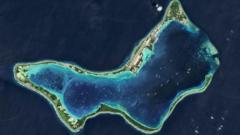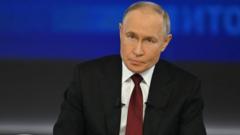The decision to cut ties marks a growing trend in Central and West Africa, where nations are reassessing their security relationships with Western powers.
Chad Ends Key Military Pact with France, Highlighting Shift in Alliances

Chad Ends Key Military Pact with France, Highlighting Shift in Alliances
Chad announces the termination of its military agreement with France, signaling a potential shift in geopolitical partnerships in the Sahel region.
Chad's recent announcement of the termination of its military cooperation agreement with France has stirred discussions regarding the evolving dynamics of international relations in Africa's Sahel region. This decision was disclosed by Chadian Foreign Minister Abderaman Koulamallah, who emphasized the need for Chad to "assert its full sovereignty." The timing of the announcement, which followed a meeting between Koulamallah and French Foreign Minister Jean-Noel Barrot, suggests a strategic realignment for the Chadian government.
With approximately 1,000 French troops stationed in Chad, providing vital intelligence and logistical support to Chadian forces, the implications of this decision are significant. Historically, Chad has been a crucial ally in the West's ongoing battle against Islamist militancy in West Africa. The recent termination of this agreement follows a pattern observed in neighboring countries, including Mali, Niger, and Burkina Faso, where similar moves have been made away from France and other Western allies in favor of partnerships with Russia.
Despite the cessation of this military agreement, Koulamallah has sought to clarify that this decision does not constitute a complete severance of relations with France. He reiterated that France remains an "essential partner." Nevertheless, he suggested that it is time for Chad to reevaluate and redefine its strategic partnerships to align with national interests and priorities.
The Chadian administration's decision reflects broader trends in the region, where countries are increasingly reevaluating their alliances amid geopolitical shifts and rising influence from non-Western nations. Observers are keen to see how this will affect Chad's internal security landscape and its relationships with other global powers, especially as it prepares for upcoming presidential elections scheduled for May.
This decision may not only change the landscape of Chad's defense strategy but could also have broader implications for Western influence in Africa, particularly as countries like Russia seek to expand their footprint in the continent’s security sector. With tensions already high due to shifting allegiances, the international community is watching closely as Chad navigates its future partnerships.
With approximately 1,000 French troops stationed in Chad, providing vital intelligence and logistical support to Chadian forces, the implications of this decision are significant. Historically, Chad has been a crucial ally in the West's ongoing battle against Islamist militancy in West Africa. The recent termination of this agreement follows a pattern observed in neighboring countries, including Mali, Niger, and Burkina Faso, where similar moves have been made away from France and other Western allies in favor of partnerships with Russia.
Despite the cessation of this military agreement, Koulamallah has sought to clarify that this decision does not constitute a complete severance of relations with France. He reiterated that France remains an "essential partner." Nevertheless, he suggested that it is time for Chad to reevaluate and redefine its strategic partnerships to align with national interests and priorities.
The Chadian administration's decision reflects broader trends in the region, where countries are increasingly reevaluating their alliances amid geopolitical shifts and rising influence from non-Western nations. Observers are keen to see how this will affect Chad's internal security landscape and its relationships with other global powers, especially as it prepares for upcoming presidential elections scheduled for May.
This decision may not only change the landscape of Chad's defense strategy but could also have broader implications for Western influence in Africa, particularly as countries like Russia seek to expand their footprint in the continent’s security sector. With tensions already high due to shifting allegiances, the international community is watching closely as Chad navigates its future partnerships.




















